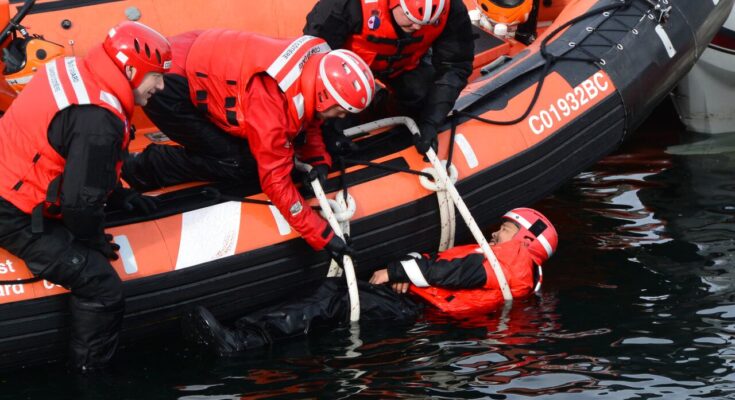Canadian Coast Guard Recruitment: The Canadian Coast Guard (CCG) stands as a vital pillar of Canada’s maritime security and environmental stewardship.
As an esteemed federal institution, it offers a diverse range of career opportunities for individuals passionate about making a significant impact in maritime services.
If you’re aspiring to be part of this revered organization, understanding the various recruitment programs available is crucial.
History and Mission of the Canadian Coast Guard
Brief History of the Canadian Coast Guard
The Canadian Coast Guard (CCG), an integral part of Canada’s rich maritime heritage, was formally established in 1962. Its inception marked the amalgamation of various government marine agencies to create a unified service dedicated to Canada’s vast coastlines and waterways. Over the years, the CCG has evolved, playing a crucial role in ensuring maritime safety, maintaining shipping routes, and protecting the marine environment. The evolution of the CCG reflects Canada’s commitment to its maritime domain, balancing the needs of economic growth with environmental stewardship.
The Mission and Core Values of the Coast Guard
At its heart, the Canadian Coast Guard’s mission is to ensure the safety, security, and accessibility of Canada’s waterways. This mission is underpinned by core values that emphasize service excellence, respect, integrity, and professionalism. The CCG is dedicated to safeguarding mariners, protecting the marine environment, and supporting maritime economic activities. This includes activities like icebreaking for safe navigation, search and rescue operations, and environmental response to maritime incidents. These values and objectives demonstrate the Coast Guard’s commitment to serving and protecting both people and the environment.
Recruitment Alignment with Their Mission
The recruitment process of the Canadian Coast Guard is deeply aligned with its mission and values. The CCG actively seeks individuals who share a passion for maritime safety and environmental conservation. Recruitment strategies focus on attracting diverse talents who are committed to public service and have a strong sense of community. By emphasizing skills like teamwork, leadership, and technical expertise, the CCG ensures that its workforce is capable of meeting the challenging demands of maritime service. This alignment ensures that the Coast Guard remains a robust and responsive force, ready to safeguard Canada’s maritime interests now and into the future.
Why Join the Canadian Coast Guard?
Embarking on a career with the Canadian Coast Guard offers an array of rewarding opportunities and benefits. If you’re considering a path that combines service, adventure, and professional development, here’s why the Canadian Coast Guard could be the ideal choice for you.
Benefits of a Career in the Canadian Coast Guard
- Diverse Career Opportunities: The Canadian Coast Guard offers a wide range of roles, from marine navigation to engineering, environmental response, and icebreaking. This diversity ensures that there is a fit for various interests and skill sets.
- Competitive Compensation and Benefits: Employees enjoy competitive salaries, comprehensive health benefits, and pension plans. The Coast Guard also provides allowances for uniforms and special duties, ensuring that team members are well-compensated for their service.
- Work-Life Balance: With a focus on employee well-being, the Canadian Coast Guard supports a healthy work-life balance through flexible work arrangements and generous leave policies.
Opportunities for Professional Growth and Development
- Continuous Learning: The Canadian Coast Guard is committed to the continuous professional development of its employees. This includes access to training programs, skill development courses, and opportunities for higher education.
- Career Advancement: There is ample room for career progression within the Coast Guard. Employees are encouraged to grow within their roles and take on new challenges, fostering a culture of learning and advancement.
- Cross-Functional Experience: Working in the Coast Guard allows for cross-functional experiences and collaboration, enriching employees’ skill sets and providing a well-rounded professional experience.
The Impact of the Coast Guard on Canadian Communities and Beyond
- Protecting Marine Environments: The Canadian Coast Guard plays a crucial role in safeguarding Canada’s marine ecosystems, contributing to environmental conservation and sustainability.
- Ensuring Safety and Security: The Coast Guard is integral in ensuring the safety and security of Canada’s waters, which is vital for the well-being of coastal communities and the nation’s economy.
- Global Influence: The Canadian Coast Guard’s work extends beyond national borders, contributing to international maritime safety and environmental efforts, thus making a global impact.
However, a career with the Canadian Coast Guard is not just a job; it’s an opportunity to make a significant difference in both local communities and the global stage, all while enjoying personal and professional growth. Joining the Canadian Coast Guard means becoming part of a proud legacy of service and excellence in protecting Canada’s maritime interests.
Overview of Canadian Coast Guard Recruitment Programs
The Canadian Coast Guard plays a vital role in ensuring the safety and security of Canada’s maritime environment. Aspiring to join this prestigious institution? Understanding the recruitment programs, eligibility criteria, and key application deadlines is essential.
General Information about Recruitment Programs
The Canadian Coast Guard offers various recruitment programs, each tailored to different roles and responsibilities within the organization. These programs are designed to attract individuals with a passion for maritime safety and environmental protection. Candidates can choose from a range of positions, from on-ship roles to coastal and inland waterway management. The programs often include rigorous training sessions, ensuring recruits are well-prepared for the challenges ahead.
Eligibility Criteria for Applicants
To join the Canadian Coast Guard, applicants must meet specific eligibility criteria. These generally include:
- Citizenship: Applicants must be Canadian citizens or permanent residents.
- Age Requirement: Candidates must be of a certain age, typically 18 years or older.
- Educational Background: Depending on the program, a high school diploma or higher education in a related field may be required.
- Physical Fitness: Given the demanding nature of the work, physical fitness is a key requirement.
- Background Check: A clean criminal record and a background check are essential for security purposes.
Key Dates and Application Deadlines
Staying informed about key dates and application deadlines is crucial for prospective applicants. These dates vary depending on the specific recruitment program. Generally, the Coast Guard announces its recruitment cycles annually, with application deadlines usually set a few months after the announcement. It’s advisable for interested candidates to regularly check the Canadian Coast Guard’s official website or subscribe to their newsletters for the most up-to-date information.
By understanding these key aspects, aspirants can better prepare themselves for a rewarding career with the Canadian Coast Guard, contributing significantly to Canada’s maritime safety and environmental protection efforts.
Exploring Career Paths in the Canadian Coast Guard
Let’s delves into the various roles within the CCG, discussing their responsibilities, career progression opportunities, and insights from current Coast Guard members.
1. Marine Navigation: At the heart of the CCG’s operations is marine navigation. Specialists in this field are responsible for guiding vessels safely through Canadian waters, ensuring the smooth transit of goods and people. Marine navigators work closely with state-of-the-art technology, providing critical information on sea conditions, weather forecasts, and navigation hazards.
Career Progression: Marine navigators can advance to higher roles such as Navigation Officer or Fleet Manager, overseeing larger areas and taking on more strategic responsibilities.
2. Environmental Response: The Canadian Coast Guard plays a crucial role in protecting Canada’s marine environment. Environmental response officers are tasked with responding to marine pollution incidents, conducting clean-up operations, and working on preventive measures to safeguard marine ecosystems.
Career Progression: Professionals in this field can progress to senior roles such as Environmental Response Coordinator or Policy Advisor, influencing national environmental policies and strategies.
3. Icebreaking: Icebreaking is a unique and challenging role within the CCG. Icebreaker crew members ensure the safe passage of vessels in ice-covered waters, supporting maritime commerce and community resupply missions. They also assist with scientific research in the Arctic and other ice-prone regions.
Career Progression: Individuals in icebreaking can grow into leadership positions, managing icebreaking operations or advising on Arctic policy matters.
Testimonials from Coast Guard Members:
To bring these roles to life, here are some insights from current CCG members:
- “Working in marine navigation has allowed me to combine my love for the sea with cutting-edge technology, ensuring safe journeys for countless vessels.” – Jane Doe, Marine Navigator
- “As an environmental response officer, I feel proud to actively contribute to the protection of our marine ecosystems.” – John Smith, Environmental Response Officer
- “Being part of the icebreaking team is both thrilling and rewarding. It’s a role where you truly feel you’re making a difference.” – Alex Johnson, Icebreaker Crew Member
A career with the Canadian Coast Guard is not just a job; it’s an opportunity to play a pivotal role in maritime safety, environmental stewardship, and national security. With a wide range of roles and clear paths for progression, the CCG offers a fulfilling and dynamic career for those passionate about Canada’s waters.
Application Process for Canadian Coast Guard Recruitment: A Comprehensive Guide
Embarking on a career with the Canadian Coast Guard (CCG) is an exciting journey. To navigate through the application process successfully, it’s essential to have a clear understanding of each step, the required documentation, and practical tips to enhance your chances. Here’s a step-by-step guide to help you through the Canadian Coast Guard recruitment process.
Step-by-Step Guide on How to Apply
- Visit the Official CCG Website: Begin by visiting the official Canadian Coast Guard website. This is your primary source for current vacancies and detailed job descriptions.
- Select a Suitable Position: Review the available positions and choose one that aligns with your skills, qualifications, and interests.
- Create an Account: Register for an account on the CCG recruitment portal. This will allow you to apply for jobs and track your application status.
- Complete the Application Form: Fill in the application form with accurate and up-to-date information. Be thorough and ensure all fields are completed.
- Submit Your Resume: Attach a well-structured resume that highlights your relevant experience, skills, and achievements.
- Answer Job-specific Questions: Some positions may require you to answer specific questions or complete a questionnaire related to the job.
- Review and Submit: Double-check your application for any errors or omissions. Once satisfied, submit your application.
Required Documents and Prerequisites
- Resume: A detailed resume outlining your education, work experience, and any relevant certifications or training.
- Educational Certificates: Copies of your diplomas, degrees, or certificates.
- Identification: Government-issued ID to verify your identity and eligibility to work in Canada.
- Security Clearance: Some roles may require security clearance, for which you will need to provide additional information.
- Medical and Physical Fitness: Proof of medical and physical fitness, especially for operational roles.
- Language Proficiency: Evidence of proficiency in English or French, depending on the role’s requirements.
Tips for a Successful Application
- Tailor Your Resume: Customize your resume for the role you are applying for, emphasizing relevant experience and skills.
- Research the CCG: Gain a good understanding of the Canadian Coast Guard’s mission and values to tailor your application accordingly.
- Prepare for Assessments: Be ready for any physical, medical, or psychological assessments that may be part of the application process.
- Practice for Interviews: If your application progresses, prepare for interviews by practicing answers to common questions and scenarios relevant to the role.
- Follow Up: After submitting your application, don’t hesitate to follow up if you haven’t heard back within a reasonable timeframe.
By following these steps and preparing thoroughly, you can increase your chances of success in joining the Canadian Coast Guard. Remember, a career with the CCG is not just a job – it’s a commitment to protecting Canada’s maritime interests and making a difference in maritime safety and security. Good luck with your application!
Training and Development Programs
In this comprehensive guide, we delve into the training and development programs that form the backbone of CCG recruitment, ensuring each member is equipped with the skills and knowledge to excel in their role.
Outline of Training Programs for New Recruits:
The journey begins with an intensive training program tailored for new recruits. This program is meticulously designed to cover all the essentials:
- Basic Training: It includes rigorous physical training, maritime skills, and first aid, ensuring recruits are prepared for the demanding nature of maritime service.
- Technical Skills Development: Recruits receive hands-on training in navigation, vessel operation, and environmental response tactics.
- Safety Protocols: A critical component focuses on safety procedures, search and rescue operations, and emergency response, ingraining a culture of safety first.
- Simulated Exercises: Realistic simulations and drills are an integral part of the training, preparing recruits for real-life scenarios they may encounter.
Ongoing Professional Development Opportunities:
The CCG’s commitment to its members extends beyond initial training. Ongoing development opportunities include:
- Leadership Programs: Designed to cultivate the next generation of leaders within the Coast Guard.
- Advanced Certifications: Opportunities to gain advanced certifications in specialized maritime skills.
- Cross-Functional Training: Encouraging members to broaden their skillset across different areas of the CCG operations.
- Continuous Learning: Access to workshops, seminars, and courses to stay updated with the latest in maritime technologies and practices.
Specialized Training Programs:
For those looking to specialize, the CCG offers a range of specialized training programs:
- Environmental Response Training: Focused on oil spill containment and environmental protection.
- Ice Navigation: Specialized training for navigating in icy waters, crucial for Canadian maritime regions.
- Aerial Surveillance: Training for those interested in aerial operations, including surveillance and air-sea rescue missions.
- Marine Communications and Traffic Services (MCTS): Specialized training in maritime communication and vessel traffic management.
The Canadian Coast Guard’s training and development programs are a testament to their commitment to excellence. These programs ensure that every recruit transforms into a skilled, knowledgeable, and confident Coast Guard member, ready to serve and protect Canada’s maritime interests with distinction. Whether you’re a new recruit or a seasoned member, the CCG offers a pathway for continuous growth and professional development.
Life in the Canadian Coast Guard: A Comprehensive Insight
Embark on a journey through the life of a Canadian Coast Guard member. This article provides an in-depth look into the daily routines, challenges, and rewards that come with being a part of this vital maritime service. We’ll also explore how Coast Guard personnel manage work-life balance and their involvement in community activities.
1. Day-to-Day Life in the Canadian Coast Guard
The Canadian Coast Guard plays a crucial role in maritime safety and environmental protection. A typical day for Coast Guard members varies significantly based on their roles. Some might be involved in navigational aid maintenance, while others participate in search and rescue operations or environmental response. The diversity of tasks ensures that no two days are the same, offering a dynamic and engaging work environment.
2. Challenges and Rewards of Working in the Coast Guard
Working in the Coast Guard comes with its set of unique challenges. Members often face harsh weather conditions and unpredictable situations at sea. However, overcoming these challenges brings immense rewards. The satisfaction of saving lives, protecting the marine environment, and serving the country is unparalleled. The camaraderie among crew members and the sense of purpose are additional benefits that Coast Guard members cherish.
3. Work-Life Balance and Community Involvement
Maintaining a healthy work-life balance is essential for the well-being of Coast Guard members. The organization supports this through flexible scheduling and providing resources for mental health and family support. Moreover, Coast Guard members are known for their active community involvement, whether it’s participating in local events, environmental initiatives, or educational programs. This involvement not only benefits the community but also enriches the lives of the members themselves.
Life in the Canadian Coast Guard is both challenging and rewarding. It offers a unique blend of adventure, service to the nation, and community connection. By understanding the day-to-day experiences of these brave men and women, we gain appreciation for their dedication to maritime safety and environmental stewardship.
Frequently Asked Questions
1. What are the basic requirements to join the Coast Guard?
Answer: The basic requirements include being a certain age, having a high school diploma or equivalent, passing a physical fitness test, and being a U.S. citizen or resident alien. Specific requirements may vary, so it’s advisable to check the official Coast Guard recruitment website for the most current information.
2. How long does the Coast Guard recruitment process take?
Answer: The timeline can vary depending on various factors, such as background checks and training schedules. Generally, it can take a few months from the time of application to when you start training.
3. Is prior maritime experience required to join the Coast Guard?
Answer: No, prior maritime experience is not a requirement. The Coast Guard provides all necessary training for its roles.
4. Can I choose my assignment in the Coast Guard?
Answer: While preferences are considered, assignments are primarily based on the needs of the Coast Guard and the skills of the individual. Flexibility is key in this process.
5. Are there opportunities for career advancement within the Coast Guard?
Answer: Absolutely! The Coast Guard offers a range of career advancement opportunities through training programs, educational benefits, and promotions based on performance and tenure.
6. Is it true that Coast Guard service is only about search and rescue missions?
Answer: This is a common misconception. While search and rescue missions are a crucial part of the Coast Guard’s duties, the scope of work is much broader, including environmental protection, maritime law enforcement, and aids to navigation.
7. Can I join the Coast Guard with a college degree?
Answer: Yes, individuals with college degrees are encouraged to apply. There are even specific programs and roles for those with higher education.
8. What are the physical fitness requirements for the Coast Guard?
Answer: The Coast Guard has a physical fitness test that includes running, push-ups, and sit-ups. The requirements can be found on the official Coast Guard website, and it’s recommended to prepare in advance.
9. How does Coast Guard service impact family life?
Answer: Like any military service, Coast Guard duty can involve deployments and relocations, which can impact family life. However, the Coast Guard is committed to supporting families and offers various resources to help manage these challenges.
10. Can I apply to the Coast Guard if I have a tattoo?
Answer: Yes, you can apply if you have a tattoo, but there are restrictions on the type and location of tattoos. It’s best to consult the recruitment guidelines for specific details.
Apply Now
Conclusion
If you find yourself drawn to a career that combines adventure, skill, and a sense of community, then the Canadian Coast Guard might just be the perfect fit for you. It’s more than a job; it’s a chance to be part of a team that safeguards the nation’s waters and contributes to environmental stewardship.
We strongly encourage interested individuals to seize this remarkable opportunity. To apply or for further inquiries, you can visit the official Canadian Coast Guard website or contact their recruitment office directly. Don’t let this chance sail away – embrace the call of the sea and become a part of a respected national institution.
Take the helm of your career and chart a course for success with the Canadian Coast Guard!



